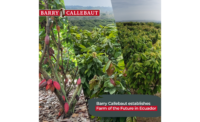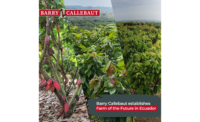Barry Callebaut: Why the future of chocolate depends on healthy forests

Deforestation is a major issue in Côte d’Ivoire and Ghana, which together produce nearly two-thirds of the world’s cocoa supply. Launched In 2017, the governments of Côte d’Ivoire and Ghana and leading cocoa and chocolate companies, representing 85 percent of global cocoa usage, joined together to form the Cocoa & Forests Initiative (CFI). Today marks the publication of Barry Callebaut’s second CFI Progress Report, highlighting the contribution it has made to tackle deforestation and its progression towards becoming forest positive by 2025.
Côte d'Ivoire and Ghana respectively lost 25 percent and 8 percent of primary forest between 2002-2019. With a significant portion of deforestation attributable to cocoa farming expansion, collective action to end cocoa-related deforestation was needed. This is why, at the 2017 UN Climate Change Conference (COP 23), the governments of Côte d’Ivoire and Ghana together with leading chocolate and cocoa companies signed the Cocoa & Forests Initiative Frameworks for Action, defining the core commitments and time-bound targets required for a deforestation-free and forest-positive cocoa supply chain.
In 2020, CFI reported on the first two years of implementation (2018 - 2019). Barry Callebaut made substantial progress towards its CFI commitments, which is also supported by its Forever Chocolate plan to make sustainable chocolate the norm by 2025. This included activities to improve farmer livelihoods, reforestation and agroforestry activities, and, importantly, the mapping of cocoa farms. This involved its teams on the ground walking farm perimeters of almost 160,000km.
As Barry Callebaut reviews its progress this year, what did it achieve despite the challenges of COVID-19, and how have its activities impacted farmers and farming communities on the ground?
Mapping for forest protection
Barry Callebaut recognizes that mapping the location of the farms it is sourcing from in its direct supply chain is the first step to ending deforestation. Mapping the size and geography of a farm indicates if it is located in, or near, a protected forest area. It has undertaken this work as a matter of priority. To date, it has now mapped 158,830 farms in Côte d’Ivoire and Ghana in its direct supply chain. This means that it has established traceability for the cocoa volumes coming from these mapped farms.
As an additional result of its intensive mapping efforts, in September 2020, it publicly disclosed its direct cocoa suppliers in Côte d’Ivoire and Ghana. The company has continued to update this map as part of its work towards a more transparent and traceable cocoa supply chain.
Growing more cocoa on less land
Farmer poverty fuels deforestation. To stop further encroachment into protected forest areas, cocoa farmers need to be equipped to increase the amount of cocoa they grow on the same, or even less, land. To increase the long-term productivity of cocoa in environmentally suitable areas, Barry Callebaut has focused coaching efforts on Good Agricultural Practices (GAP), which include the topics of replanting, pruning, and soil nutrition. Last year, it trained 125,965 farmers, providing agricultural inputs such as fertilizers, planting materials, and crop diversification packages.
As well as farm mapping, it distributed over 1.2 million cocoa seedlings in Ghana. In addition to its efforts in previous years of over 1.8 million, these figures show that the company is on track to reach its 2022 CFI commitment of 3.2 million seedlings. Last year, it also distributed just over 1.6 million shade trees in Côte d’Ivoire and Ghana.
Using innovation to scale
Last year the company commenced a large-scale ecosystem restoration project in Côte d’Ivoire. As part of this project, ut will pilot innovative seedling generation, planting, and monitoring in harsh conditions. In the next fiscal year, the company will continue with the pilot to determine how it can scale the initiative by investigating new drone and artificial intelligence technology for monitoring and seeding purposes.
COVID-19 presented many challenges in terms of logistics, transportation, and delivery of farmer training. However, thanks to the early adoption of precautionary measures and the dedication and teamwork of Barry Callebaut's employees and partners, its progress shows that it managed to continue with its efforts to support cocoa farmers, eliminate deforestation from its supply chain, and promote forest restoration and protection in the cocoa supply chain.
Implementing CFI is about creating knowledge, establishing trust, and showing tangible results
Based in Kumasi, Ghana, Hamidu Issaka, 35, community development manager, Barry Callebaut, helps cocoa farmers to acquire key skills and knowledge to improve their lives and communities by employing responsible labor practices, professionalize their farms, increase productivity and increase resilience against climate change.
Hamidu believes the mapping of farms is one of CFI’s most important activities. Farm mapping allows Barry Callebaut to continue its steady progression towards a more transparent supply chain. In addition, mapping also brings many benefits to the farmer.
“We often find that a farmer has no idea about the size of his farm, which may not seem like such a huge problem. But, for example, if a farmer thinks his plot is four hectares, when it is in fact only two hectares, consider the substantial cost savings he could make by buying fertilizer for only two hectares. In addition, it also prevents the farmer from applying too much fertilizer, which has a detrimental impact on yield. Mapping gives farmers a better understanding of their own operations.”
Hamidu Issaka, 35, has always had a passion for supporting farmer livelihoods. “I first volunteered with an agribusiness growth initiative to support cocoa farmer livelihoods when I was in college.”
Mapping extends beyond measuring the size and geographical location of a cocoa farm. Household data is also collected, which allows for the development of tailored, individualized farm plans. Providing farmers with the appropriate training and services, based on their individual situation and farm profile, supports their journey out of poverty.
“When farmers see the end results of applying Good Agricultural Practices, it enables them to look beyond this season’s crop, and to a more sustainable farming future. They see that increasing cocoa yield with the same amount of land is possible.”
Hamidu believes establishing trust is a critical factor for successful engagement with farmers and farming communities.
“Achieving trust with farmers and communities involves frequent visits, being visible in the community, offering regular farmer training, and being available to provide guidance and support when needed. Showing farmers real, tangible results also achieves buy-in. An example here is the work we do with underplanting, whereby we prune back the older cocoa trees, clear weeds, and plant young seedlings underneath. Farmers see that the older trees suddenly start producing more - and they ask me why this is happening. I explain that by pruning, clearing waste and underplanting, the older trees can become healthier whilst the young ones are growing. Planting shade trees has the same effect. Shade-grown cocoa improves soil quality and can increase biodiversity on the cocoa farm.”
“We’re working hard to show farmers that rehabilitating their existing farmland and diversifying their income with other crops, for example, will not hurt their current income and, in fact, is very likely to increase it.”
Becoming forest positive: actions for 2021 and beyond
Barry Callebaut is committed to ending deforestation in the cocoa and chocolate industry. Working in close partnership and collaboration with industry, governments, and civil society, the company can continue to deliver on the objectives it sets for itselves. For more information on itsCFI Progress, please view its CFI Progress Report 2020.
Going forward, the company will continue to explore what’s needed to scale innovative solutions as well as investigate the latest opportunities in technology. In addition, it will advance its efforts to promote large-scale reforestation, in order to become forest positive, mitigate the impacts of climate change, and restore the ecosphere of forests.
Looking for a reprint of this article?
From high-res PDFs to custom plaques, order your copy today!








